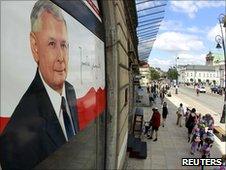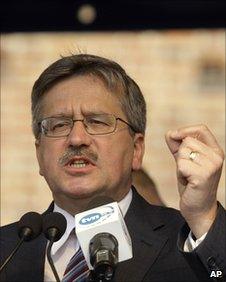Tragedy overshadows Polish presidential poll
- Published

Jaroslaw Kaczynski is one of the leading candidates in Sunday's election
Poland's presidential election campaign has been extraordinary in that it was triggered by a plane crash that killed President Lech Kaczynski and dozens of senior state officials in April.
The short campaign has been overshadowed, at least initially, by the shock and sense of loss felt by most Poles over the tragedy.
Although he was a divisive president, the manner of his death has led some Poles to re-evaluate Lech Kaczynski's legacy and ponder whether the media portrayed him too negatively while he was alive.
Jaroslaw Kaczynski, Lech's twin, is one of the leading candidates in Sunday's election, and the tragedy has had a direct impact on both his support and behaviour.
"People want to believe we had this very good and charming, if slightly bumbling, president. There's a sense that if the media were so wrong about Lech, maybe they were also wrong about his twin Jaroslaw," Konstanty Gebert, columnist for leading daily Gazeta Wyborzca, told the BBC.
Jaroslaw Kaczynski, a 61-year-old former prime minister who lives with his mother and once confessed to not having a bank account, has gone from being one of the country's least trusted politicians before the crash to the second most supported candidate in this election.
"The tragedy improved dramatically the chances of the surviving twin brother who is basking in the martyrdom - at least that's how it's been portrayed - of his brother," Mr Gebert says.
Mr Kaczynski and his campaign staff have portrayed him as a man of compromise who can rise above political squabbles for the good of the nation.
"Poland is most important" is his campaign slogan.
This image contrasts markedly with the ruthless, but pragmatic politician a majority of Poles voted out of office in 2007, after he once compared his government's opponents to the communist-era riot police.
More gentle campaign
His main opposition then was not the former communists, but the centre-right Civic Platform, which, like Mr Kaczynski's Law and Justice Party, sprang from the Solidarity movement that opposed communism in the 1980s.

Bronislaw Komorowski was the clear poll favourite before the crash
Civic Platform now heads the government and its candidate, the 58-year-old parliamentary speaker Bronislaw Komorowski, was the clear favourite to become the country's next president before the crash.
As speaker of the lower house, Mr Komorowski is now the country's acting president, and he has had the challenging task of leading the country through the period of mourning to Sunday's election, which he is striving to win.
All opinion polls still put him in the lead, although one saw Mr Kaczynski narrow the gap to just four percentage points.
"The tragedy has increased the Kaczynski electorate. There is something of a sympathy vote, but it has also boosted Komorowski, who as acting president has performed rather well," Mr Gebert said.
Some commentators believe the tragedy will not have a decisive impact on Sunday's vote.
"Of course, feelings are not as intense as they were right after the crash," columnist Jacek Zakowski told the BBC.
"Time has passed and it appears the causes of the crash were quite complicated. It's still valid, but its importance is declining," he said.
Changed?
The plane crash did initially create a sense of togetherness in Polish society, but it did not eliminate the pre-existing political divisions, merely softening the debate.
"It has to an extent eliminated the extreme nastiness which characterised previous campaigns," Mr Gebert said, adding that this campaign has caused just two court cases whilst the previous one provoked 20.
At the moment, opinion polls suggest neither of the front-runners will secure a majority, and a second round run-off will be required on 4 July, which, according to all the polls, Mr Komorowski, is expected to win.
The unknown factor is how many voters will believe Mr Kaczynski has changed in the wake of his twin's death.
He ends his campaign on Friday, his birthday and the first without his twin, with a visit to his brother's tomb in the Wawel Cathedral in Krakow.
One politician who does not believe in that change is the left-wing former prime minister, Wlodzimierz Cimoszewicz, who has backed Mr Komorowski.
"If one relies on his comments in the past few weeks, we could expect calm and co-operation," Mr Cimoszewicz said in a recent interview with Gazeta Wyborcza.
"I prefer to evaluate his activity over the last 20 years. He was never a person of understanding or compromise," he said.
- Published18 June 2010